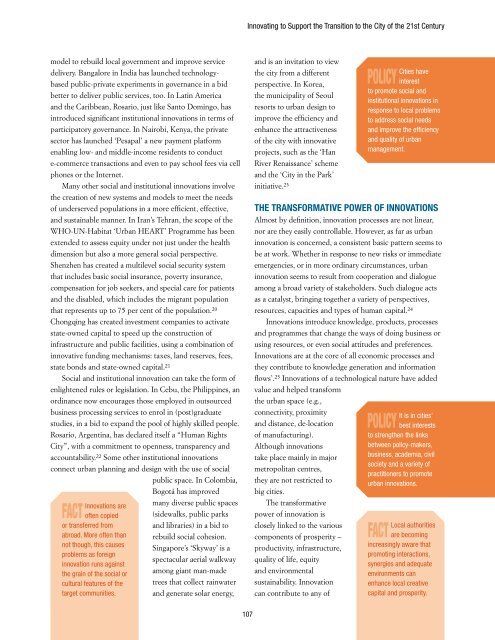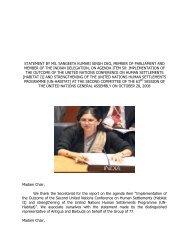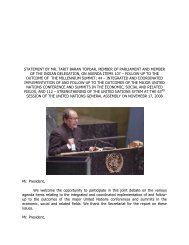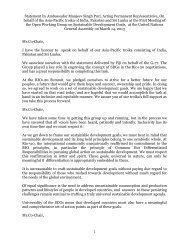STATE OF THE WORLD'S CITIES 2012/2013 Prosperity
STATE OF THE WORLD'S CITIES 2012/2013 Prosperity
STATE OF THE WORLD'S CITIES 2012/2013 Prosperity
You also want an ePaper? Increase the reach of your titles
YUMPU automatically turns print PDFs into web optimized ePapers that Google loves.
model to rebuild local government and improve service<br />
delivery. Bangalore in India has launched technologybased<br />
public-private experiments in governance in a bid<br />
better to deliver public services, too. In Latin America<br />
and the Caribbean, Rosario, just like Santo Domingo, has<br />
introduced significant institutional innovations in terms of<br />
participatory governance. In Nairobi, Kenya, the private<br />
sector has launched ‘Pesapal’ a new payment platform<br />
enabling low- and middle-income residents to conduct<br />
e-commerce transactions and even to pay school fees via cell<br />
phones or the Internet.<br />
Many other social and institutional innovations involve<br />
the creation of new systems and models to meet the needs<br />
of underserved populations in a more efficient, effective,<br />
and sustainable manner. In Iran’s Tehran, the scope of the<br />
WHO-UN-Habitat ‘Urban HEART’ Programme has been<br />
extended to assess equity under not just under the health<br />
dimension but also a more general social perspective.<br />
Shenzhen has created a multilevel social security system<br />
that includes basic social insurance, poverty insurance,<br />
compensation for job seekers, and special care for patients<br />
and the disabled, which includes the migrant population<br />
that represents up to 75 per cent of the population. 20<br />
Chongqing has created investment companies to activate<br />
state-owned capital to speed up the construction of<br />
infrastructure and public facilities, using a combination of<br />
innovative funding mechanisms: taxes, land reserves, fees,<br />
state bonds and state-owned capital. 21<br />
Social and institutional innovation can take the form of<br />
enlightened rules or legislation. In Cebu, the Philippines, an<br />
ordinance now encourages those employed in outsourced<br />
business processing services to enrol in (post)graduate<br />
studies, in a bid to expand the pool of highly skilled people.<br />
Rosario, Argentina, has declared itself a “Human Rights<br />
City”, with a commitment to openness, transparency and<br />
accountability. 22 Some other institutional innovations<br />
connect urban planning and design with the use of social<br />
public space. In Colombia,<br />
Bogotá has improved<br />
Innovations are<br />
many diverse public spaces<br />
FACT often copied (sidewalks, public parks<br />
or transferred from<br />
and libraries) in a bid to<br />
abroad. More often than rebuild social cohesion.<br />
not though, this causes<br />
Singapore’s ‘Skyway’ is a<br />
problems as foreign<br />
spectacular aerial walkway<br />
innovation runs against<br />
the grain of the social or<br />
among giant man-made<br />
cultural features of the trees that collect rainwater<br />
target communities. and generate solar energy,<br />
Innovating to Support the Transition to the City of the 21st Century<br />
107<br />
and is an invitation to view<br />
the city from a different<br />
perspective. In Korea,<br />
the municipality of Seoul<br />
resorts to urban design to<br />
improve the efficiency and<br />
enhance the attractiveness<br />
of the city with innovative<br />
projects, such as the ‘Han<br />
River Renaissance’ scheme<br />
and the ‘City in the Park’<br />
initiative. 23<br />
<strong>THE</strong> TRANSFORMATIvE POWER <strong>OF</strong> INNOvATIONS<br />
Almost by definition, innovation processes are not linear,<br />
nor are they easily controllable. However, as far as urban<br />
innovation is concerned, a consistent basic pattern seems to<br />
be at work. Whether in response to new risks or immediate<br />
emergencies, or in more ordinary circumstances, urban<br />
innovation seems to result from cooperation and dialogue<br />
among a broad variety of stakeholders. Such dialogue acts<br />
as a catalyst, bringing together a variety of perspectives,<br />
resources, capacities and types of human capital. 24<br />
Innovations introduce knowledge, products, processes<br />
and programmes that change the ways of doing business or<br />
using resources, or even social attitudes and preferences.<br />
Innovations are at the core of all economic processes and<br />
they contribute to knowledge generation and information<br />
flows’. 25 Innovations of a technological nature have added<br />
value and helped transform<br />
the urban space (e.g.,<br />
connectivity, proximity<br />
and distance, de-location<br />
of manufacturing).<br />
Although innovations<br />
take place mainly in major<br />
metropolitan centres,<br />
they are not restricted to<br />
big cities.<br />
The transformative<br />
power of innovation is<br />
closely linked to the various<br />
components of prosperity –<br />
productivity, infrastructure,<br />
quality of life, equity<br />
and environmental<br />
sustainability. Innovation<br />
can contribute to any of<br />
POLICy<br />
Cities have<br />
interest<br />
to promote social and<br />
institutional innovations in<br />
response to local problems<br />
to address social needs<br />
and improve the efficiency<br />
and quality of urban<br />
management.<br />
POLICy<br />
It is in cities’<br />
best interests<br />
to strengthen the links<br />
between policy-makers,<br />
business, academia, civil<br />
society and a variety of<br />
practitioners to promote<br />
urban innovations.<br />
FACT<br />
Local authorities<br />
are becoming<br />
increasingly aware that<br />
promoting interactions,<br />
synergies and adequate<br />
environments can<br />
enhance local creative<br />
capital and prosperity.















![1 statement by dr.[mrs] kakoli ghosh dastidar - Member States Portal](https://img.yumpu.com/27526598/1/190x245/1-statement-by-drmrs-kakoli-ghosh-dastidar-member-states-portal.jpg?quality=85)

